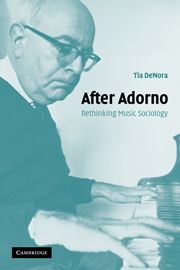Book contents
- Frontmatter
- Contents
- List of figures
- List of music examples
- Preface: a two part invention
- Acknowledgements
- A note on background reading
- 1 Adorno, ‘defended against his devotees’?
- 2 New methods and classic concerns
- 3 Music as cognition
- 4 How does music ‘channel’ emotion?
- 5 Music and ‘control’
- 6 After Adorno: rethinking music sociology
- Bibliography
- Index
5 - Music and ‘control’
Published online by Cambridge University Press: 22 September 2009
- Frontmatter
- Contents
- List of figures
- List of music examples
- Preface: a two part invention
- Acknowledgements
- A note on background reading
- 1 Adorno, ‘defended against his devotees’?
- 2 New methods and classic concerns
- 3 Music as cognition
- 4 How does music ‘channel’ emotion?
- 5 Music and ‘control’
- 6 After Adorno: rethinking music sociology
- Bibliography
- Index
Summary
Popular music is objectively untrue and helps to maim the consciousness of those exposed to it.
(Adorno 1976:37–8)Because it is so crudely simple, however, the standardization of that music should be interpreted not so much intramusically as sociologically. It aims at standardized reactions, and its success – notably its adherents' fierce aversion to anything different – proves that it has gained its end. It is not only the interested parties, the producers and distributors of pop music, who manipulate the way it will be heard; it is the music itself, so to speak, its immanent character. It sets up a system of conditioned reflexes in its victim, and the crux is not even the antithesis of primitivity and differentiation. Simplicity in itself is neither an asset nor a shortcoming. But in all music that deserves the name of art, every detail, even the simplest, would be itself; none would be arbitrarily interchangeable …
(Adorno 1976:29)When Adorno speaks about music's link to ‘standardized reactions’, as he puts it, and suggests that music ‘sets up a system of conditioned reflexes in its victim’, he is talking about what, for him, is the ‘wrong’ kind of music – popular music writ large and also all those ‘classical’ composers and works (Rachmaninov, Tchaikovsky, Stravinsky – the list could easily be expanded) of whom he disapproves. In his view, these forms of music inculcate conformism; they are nothing less than a mechanism of social control.
- Type
- Chapter
- Information
- After AdornoRethinking Music Sociology, pp. 118 - 150Publisher: Cambridge University PressPrint publication year: 2003



